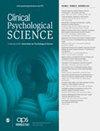触发警告、内容警告和内容注释效果的荟萃分析
IF 4.1
2区 医学
Q1 PSYCHIATRY
引用次数: 7
摘要
触发警告、内容警告或内容注释是关于即将发布的内容的警报,这些内容可能包含与过去负面体验相关的主题。提倡者声称,警告可以帮助人们在情感上为痛苦的材料做好准备或完全避免。批评人士认为,警告既助长了一种与循证治疗实践不一致的回避文化,又让人对即将到来的内容产生恐惧。最近,一项心理学研究开始对这些说法进行实证调查。我们提出了对这些警告影响的所有实证研究的荟萃分析结果。总的来说,我们发现警告对负面材料的情感反应或教育结果没有影响。然而,警告确实增加了预期的影响。关于回避的研究结果好坏参半,这表明警告要么对材料的接触没有影响,要么在特定情况下增加了对负面材料的接触。讨论了政策和治疗实践的局限性和影响。本文章由计算机程序翻译,如有差异,请以英文原文为准。
A Meta-Analysis of the Efficacy of Trigger Warnings, Content Warnings, and Content Notes
Trigger warnings, content warnings, or content notes are alerts about upcoming content that may contain themes related to past negative experiences. Advocates claim that warnings help people to emotionally prepare for or completely avoid distressing material. Critics argue that warnings both contribute to a culture of avoidance at odds with evidence-based treatment practices and instill fear about upcoming content. A body of psychological research has recently begun to empirically investigate these claims. We present the results of a meta-analysis of all empirical studies on the effects of these warnings. Overall, we found that warnings had no effect on affective responses to negative material or on educational outcomes. However, warnings reliably increased anticipatory affect. Findings on avoidance were mixed, suggesting either that warnings have no effect on engagement with material or that they increased engagement with negative material under specific circumstances. Limitations and implications for policy and therapeutic practice are discussed.
求助全文
通过发布文献求助,成功后即可免费获取论文全文。
去求助
来源期刊

Clinical Psychological Science
Psychology-Clinical Psychology
CiteScore
9.70
自引率
2.10%
发文量
35
期刊介绍:
The Association for Psychological Science’s journal, Clinical Psychological Science, emerges from this confluence to provide readers with the best, most innovative research in clinical psychological science, giving researchers of all stripes a home for their work and a place in which to communicate with a broad audience of both clinical and other scientists.
 求助内容:
求助内容: 应助结果提醒方式:
应助结果提醒方式:


